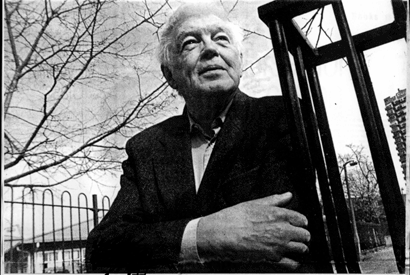
My favorite left-anarchist writer, Colin Ward, has passed away at age 85. Ward was the most practical radical I've ever read: Rather than sketching out utopian blueprints of a society without a state, he searched for empirical examples of everyday people organizing to solve their own problems. Once he started looking, he found that voluntary, non-authoritarian cooperation was everywhere. Utopia, he wrote in his 1973 book Anarchy in Action, is "already here, apart from a few little, local difficulties like exploitation, war, dictatorship and starvation."
Because he took his ideals seriously, Ward butted heads regularly with both the conventional left and the conventional right. In the '80s and early '90s, his column for New Statesman & Society was peppered with examples of the Tory government failing to live up to its rhetoric of liberty and decentralized power. At the same time, he was harshly critical of the social democratic left. In one of his most famous passages, he pointed out that
When we compare the Victorian antecedents of our public institutions with the organs of working-class mutual aid in the same period the very names speak volumes. On the one side the Workhouse, the Poor Law Infirmary, the National Society for the Education of the Poor in Accordance with the Principles of the Established Church; and, on the other, the Friendly Society, the Sick Club, the Cooperative Society, the Trade Union. One represents the tradition of fraternal and autonomous association springing up from below, the other that of authoritarian institutions directed from above.As Stuart White notes in his tribute to Ward, the writer was
a formidible and dedicated opponent of what is often understood as the Fabian tradition. This comes across very clearly in his work on housing where he was always highly critical of state-heavy efforts, led by middle-class housing professionals, to provide housing for the working-classes. In this context, he argued for the alternative left tradition of cooperative self-help in the form of tenant cooperatives, self-build projects and squatting. He pointed repeatedly to the illogicality of local governments - often Labour-controlled - who would rather destroy unused council housing stock than allow it to be occupied by squatters.These squatters, to be clear, were not self-righteous trustafarians seizing a private home while the owner took a holiday. They were ordinary families finding uses for resources the state had left fallow. Such self-organization was a longtime theme in Ward's work. Quoting White again: "Much to the consternation of the [postwar] Labour government, many thousands of working-class people responded to acute housing shortage by taking over and adapting disused military bases. While his comrades in the anarchist movement struggled to see the point, Colin saw this as an example of what he would later call 'anarchy in action': direct and cooperative self-help." Ward's interest in the institutions that people build from below took him to areas that radical writers rarely touched: He wrote appreciative histories and sociologies of holiday camps, allotment gardens, amateur music-making, even the street culture of urban children.
Ward had an eye for the creativity of ordinary people and the ways we use that inventive energy to transform our environments. He didn't have trouble imagining a society immersed in liberty and spontaneous order, because he knew that liberty and spontaneous order were what sustained society in the first place, even if they sometimes had to take a stunted form.
